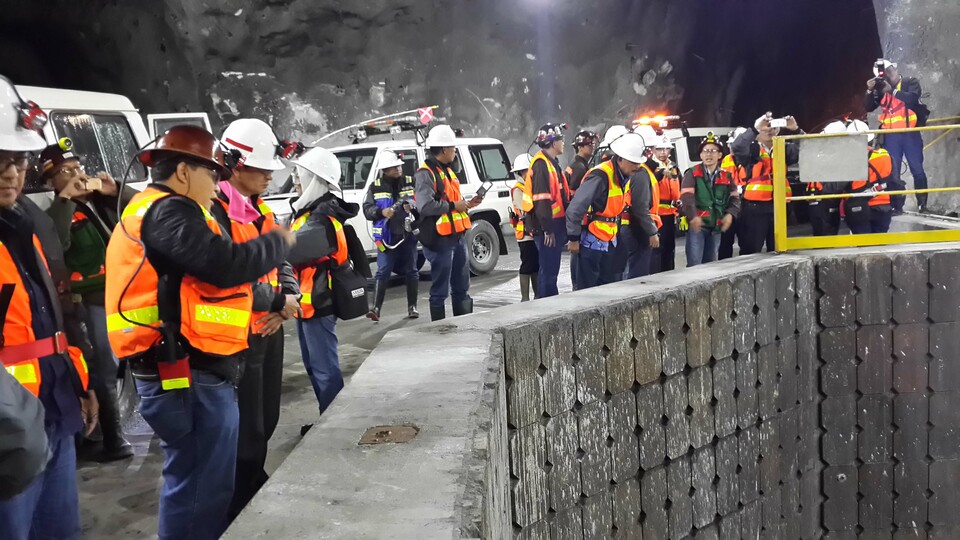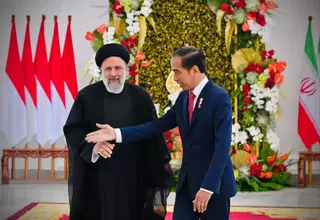Factbox: Indonesia's Huge Papua Mine Run by Freeport Long a Source of Friction

US mining giant Freeport-McMoRan warned this week it could take the Indonesian government to arbitration and seek damages over a contractual dispute that has halted operations at the world's second-biggest copper mine.
Freeport's Grasberg mine holds more gold and copper reserves than any other in the world, but has frequently been a source of controversy over the revenue share Indonesia and Papua get from the mine and the impact of its tailings on local water systems.
Here are some facts on the Grasberg mine in Papua:
Grasberg mine
Freeport-McMoRan began mining in Papua in 1967, the first company to sign for mineral resource rights under a foreign investment law put in place by former President Suharto. Open-pit copper and gold mining at Grasberg began in 1990.
Mining at the open pit, which is visible from space, is due to cease in late 2018, when underground mining will become the main source of copper ore.
An estimated 94 percent of the mine's remaining reserves are recoverable only underground. As of December 2015, Grasberg accounted for 28 percent of Freeport's total recoverable proven and probable copper reserves of 99.5 billion pounds.
In 2017, the mine is expected to account for 1.3 billion pounds of Freeport's global copper sales of 4.1 billion pounds.
Labor and safety
Freeport employs more than 32,000 in Indonesia, including 12,000 employees and 20,000 contractors. Around 97 percent of its workers are Indonesian nationals, many of them Papuan.
The mine area suffers regular earthquakes, and torrential rainfall can trigger landslides. Its position on top of a mountain also means workers can suffer altitude sickness, and visibility is often poor due to thick mists.
At least partly because of these factors, safety at the mine has been a longstanding source of friction with unions. A tunnel collapse that killed 28 workers in 2013 raised worries about Freeport's plans to ramp up its underground mining operation.
Workers also staged a strike for three months in 2011, seeking a bigger slice of the revenue from record copper prices.
Security and taxes
Security at Grasberg has been volatile with pro-independence rebels in Papua waging a low-level conflict for decades. Analyst have also linked violence at or near the mine to conflicts between the police and military over security arrangements and related business ventures.
Between 2009 and 2015, shootings within the mine project area killed 20 and wounded 59. To protect workers and infrastructure, Freeport contributed $21 million toward government-provided security in 2015.
Freeport Indonesia is one of the largest taxpayers in Indonesia, with more than $16 billion paid to the government in royalties, taxes and dividends between 1992 and 2015.
The Freeport unit is currently in a dispute over $469 million in water taxes and penalties claimed by Papua province that date back to 2011.
The mine was at the centre of a scandal in 2015 after Indonesia's parliament speaker was accused of attempting to extort shares worth $1.8 billion from Freeport.
Setya Novanto denied the allegations but resigned amid the scandal in December 2015. He was reinstated in November last year after an investigation was dropped.
Economic impact
Freeport-McMoRan and Rio Tinto —which is entitled to a share of Grasberg output via a joint venture signed in 1995 — have been targeted by campaign groups over alleged human rights and environmental issues at Grasberg.
Rio Tinto has said it is considering exiting its interest in the mine, which has yielded no benefit for it since 2014, when exports were suspended for six months while Freeport negotiated mining and tax rules with Indonesia.
On Sept. 9, 2008 one of Rio Tinto's major shareholders, Norway's sovereign wealth fund, sold its entire $850 million stake in the company citing environmental damage at Grasberg.
Freeport was excluded by the Norwegian fund in June 2006 for the same reason.
Reuters
Tags: Keywords:POPULAR READS
KPK Identifies Sidoarjo Regent as Suspect in Corruption Probe
KPK has identified Ahmad Muhdlor Ali as a suspect in a corruption case involving the Sidoarjo Regional Tax Service AgencyEconomic Concerns Overshadow Security Worries for Indonesians in Iran
Indonesian citizens currently in Iran are more concerned about rising inflation than the security situation in the country.IDX Slides 2 Percent as Geopolitical Conflict Rattles Market Confidence
The IDX attributed the subdued performance of the index at the start of the week to the escalating geopolitical tensions in the Middle EastRupiah Declines Against Dollar Amid Geopolitical Unrest
The Indonesian rupiah depreciated against the US dollar in Tuesday's trading session, driven by escalating tensions between Iran and IsraelNasdem Vows to Honor the Constitutional Court Ruling on 2024 Presidential Election Dispute
Nasdem's Willy Aditya commits to respect the Constitutional Court's ruling on the 2024 presidential election dispute.Popular Tag
Most Popular






















